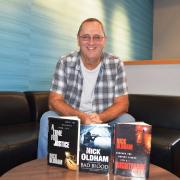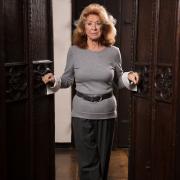Since it was founded in the early 1970s the Manchester Camerata has performed the world’s best music in some of the most prestigious venues.
The orchestra has a reputation for exciting performances and its musicians have received standing ovations and glowing reviews across the globe.
They performed virtual concerts for more than a million people during the pandemic, their Mozart recitals have had more than two million plays on music streaming service Spotify, and their Hacienda Classical show opened the 2017 Glastonbury Festival in front of a crowd of 40,000.
But few concerts give the musicians the same emotional response as on a Wednesday morning in Gorton.
The venue is the equal of any concert hall in the world, but today’s performance is a little different.

A circle of chairs stands in the middle of Gorton Monastery’s cavernous nave. At the centre of the circle is a table piled with percussion instruments and to one side, in a gap between chairs, there is a keyboard.
People arrive quietly, mostly in twos, their footsteps echoing around the vast space and disturbing the reverential hush. There are some whispered conversations and each person is given a name badge and offered a drink. Before they take a seat, everyone collects an instrument. As the circle fills, the buzz of conversation swells and the jingle of bells and the rattle of shakers becomes more frequent.
There is always an air of expectation and excitement before a concert and, as happens in concert halls the world over, the hubbub quietens as the musicians arrive.

Amina Hussain takes her seat at the keyboard and looks around the circle. She smiles, makes eye contact with everyone there, says hello and there is a collective pause. A breath.
Then a man whose name badge says ‘Steve’, sitting in the circle to Amina’s right, shakes a maraca and the music begins. At once the circle is alive with a rhythmic beat to which Amina responds.
There is no programme for this concert. No music to be followed. There is no stage and there is no separation between musician and audience – here, everyone is making music.
This is one of Manchester Camerata’s Music in Mind events for people with dementia and their carers.
The Camerata formed in 1972 and they have been based at Gorton Monastery since 2021. They also run events like this in Oldham, Rochdale and Wigan and a bid has recently been submitted for funding which would allow them to extend that provision to more parts of the wider city area.

Amina, the Camerata’s principal flute and resident music therapist, says: ‘The dementia programme started about 12 years ago and I have been involved from the start.
‘There is a direct impact here compared to being on a stage. It’s the simplest thing and it’s making such a huge difference.
‘The musicians are conduits for the music, we listen to what’s happening and respond to it. We are trying to put the people who attend the sessions in a position where they recognise they are in charge. There is no right and wrong here – they can do whatever they like.’
And they do.
Some are up dancing, some sway in their seat, some sing, some swap their instruments and others – notably the two chaps who were they early and claimed a snare drum each – make clear they won’t be swapping. They keep the beat and are quick to adapt when Amina senses a change in the room and her tune segues seamlessly You Are My Sunshine to Oh When The Saints. Today's repertoire also features classical pieces, folk songs and one or two pop tunes.
Aine Molines, from Lancaster, is a flautist with the Camerata and has been involved with the Music in Mind programme for about 18 months.

‘These sessions are great fun,’ she says. ‘It’s an incredible part of my job and you never know what’s going to happen. We’re having a conversation with these people through music and we get to see them react and that is lovely.
‘When they come and sit down in the morning, they may not remember being there or taking part before, but we see them grow in confidence and become more involved. It’s amazing to witness the power of music like that. Families tell us they love coming and that the sessions make a real difference and brighten the day for them and their loved one.’
And Lynne Fell, who has played clarinet in the Camerata for 36 years adds: ‘I love things like this the most. It’s much more personal than being on a traditional stage, separated from the audience and I really enjoy that interaction, I think we all do.
‘We can see the joy music brings and the impact it has. There are so many smiles in the room at the end of a session.’

During the free hour-long session the Camerata members – today it’s Lynne, Aine and cellist Graham Morris – move around the circle, playing their own instrument, or bells and shakers from the table. They sit with people and follow their movements, playing along with them.
There are about 40 people in the circle this time, including Giles Wilmore, the chief executive of Music in Mind.
‘These sessions are fun social activities but they also have real health benefits and we hope to grow the programme,’ he says. ‘We hold sessions in care homes, community centres and village halls but this is our flagship venue. Wherever we are though, we see people light up when they engage with the music.

‘The ethos of Music in Mind is very much that there is no differentiation between people with dementia, their carers, the volunteers and the musicians – everyone is a part of the music making.
‘Music can help people – it can reduce agitation and anxiety and it can stimulate memories and I would hope in the future that people could be referred to us – we could almost be available on prescription to provide health and wellbeing benefits.’
Chris Larkin, the Alzheimer’s Society associate director for services, is here too – playing a tambourine enthusiastically. He lived in Manchester for 20 years and he says: ‘Dementia can shrink a person’s world and dramatically reduce their social opportunities.

‘It is hugely important for people with dementia, and their families, to do something fun. It takes you away from the dementia and allows you to focus on something else, something fun.
‘Music can be very evocative and there is something very special about the connection between the orchestra and the people with dementia. These groups are run in a way that makes sure everyone is involved. We would love for everyone affected by dementia to have access to music and singing opportunities, like this and our Singing for the Brain sessions which we run around the country.
‘Dementia is very serious and it is very tough but it’s something people have to live with and it’s important to make the most of life and to have something fun to look forward to.’
When the session comes to an end and people start to drift away to the cafe or make their way home, there is noticeably more noise than there had been when they arrived. There is a buzz of conversation and bursts of laughter.
Pete is one of the regulars at the group with his wife Sandra and her mum Mo. He says: ‘I like coming and mixing with other people and making music. The people are absolutely wonderful.’

And Sandra adds: ‘If we’re feeling a bit down, it’s great because it takes your mind off everything else. These sessions are incredible. The musicians are great. They have so much energy and they spend time with each person in the room. I enjoy coming – it's relaxing for me, and it gives real stimulation to Pete.’
Alan has been attending the sessions for about 12 months and played one of the snare drums throughout the session. ‘I didn’t know I was a drummer until I came,’ he says. ‘It’s good to come, I live on my own and it gets me out of the house and there’s some good company.’

His son Garry adds that his dad played the bass drum in the Boys’ Brigade in his youth.
John started attending the sessions in August and was this morning other drummer. His daughter Jo says: ‘He loves it. Dad’s a bit of an extrovert and being here allows him to be himself. There aren’t many things that keep him so focused and the mental and physical stimulation are important.
‘Later today, he won’t remember where we’ve been this morning but he’ll know he’s enjoyed himself.’
* For more information, go to manchestercamerata.co.uk and musicinmindremote.com. And to find out more about dementia and services available across Lancashire, visit alzheimers.org.uk.





























